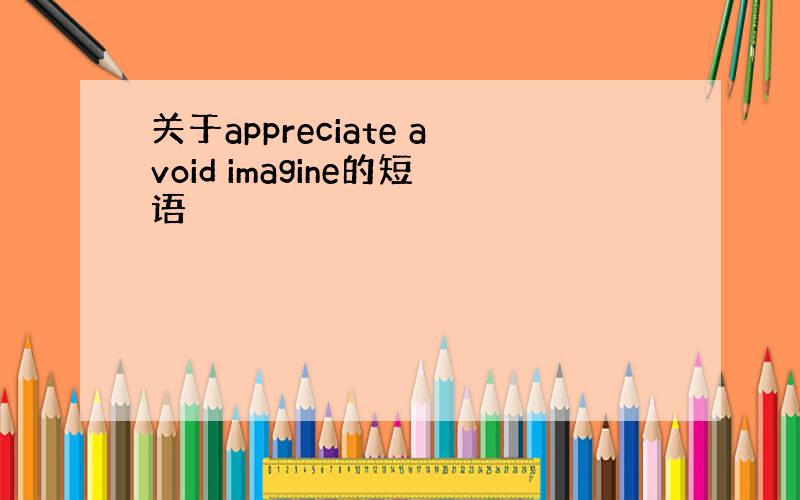关于appreciate avoid imagine的短语
来源:学生作业帮 编辑:大师作文网作业帮 分类:英语作业 时间:2024/11/16 13:15:00
关于appreciate avoid imagine的短语

第一:appreciate的用法 一、词义用法问题 1. 欣赏,赞赏 That’s because you can’t appreciate music. 这是因为你不能欣赏音乐. I appreciate his generosity. 我赞赏他的慷慨大方. 2. 理解.体会 I appreciate the difficulty. 我理解这种困难. I am afraid you don’t appreciate America. 恐怕你不理解美国. 3. 感谢,感激 I appreciate your goodness in calling. 我感谢你好心来访. He appreciated their confidence. 他感激他们的信任. 二、后续宾语问题 其后可接名(代)词、动名词、名词性从句等作宾语,但不能接不定式.如: We shall appreciate hearing from you again. 能再次收到你的来信,我们将十分感激. I appreciate that you have come here so early. 感谢你来得这么早. 注意: 其后只能接“事”作宾语,而不能接“人”作宾语 (注意:这与thank 的用法恰恰相反).如: 正:I appreciate your kindness. 谢谢你的好意. 误:I appreciate you for your kindness. 正:He thanked her for her kindness. 他感谢她的好意. 误:He thanked her kindness. 三、后接 if 或 when 从句的问题 其后不直接跟if或when引导的从句,若语义上需要接这类从句,需借助it.如: I would appreciate it very much if you would help me with it. 如果你能帮助我做这事,我会十分感激. We really appreciate it when she offered to help. 她来帮忙了,我们十分感激. 四、有关修饰语的问题 要表示程度,可用 deeply, highly, (very) much 等副词修饰.如: I deeply appreciate your kindness. 我深深感谢你的好意. He highly appreciated their help. 他非常感谢他们的帮助. 注意:much 修饰 appreciate时,只能置于其前,而不能置于其后但 very much 却可以): 我们非常感谢你的邀请.(from www.yywords.com ) 正:We much appreciate your invitation. 正:We appreciate your invitation very much. 误:We appreciate your invitation much. 第二:avoid的用法 1. 从意思上看,可表示“避开”或“躲避”(keep oneself from)某人或某物;也可表示“防止”(prevent)某事的发生.如: I think she is avoiding me. 我想她是在躲着我. Try to avoid accidents. 尽量防止发生事故. I avoided him as much as possible. 我尽量避开他. You should avoid such mistakes. 你应当避免这样的错误. Thus he avoided a heart attack. 就这样他避免了一次心脏病复发. The very wise avoid such a temptation. 真正聪明的人都避开这种诱惑. I realized he was trying to avoid the topic. 我意识到他是在设法避开这个话题. 2. 从用法上看,其后可接名词或代词作宾语,也可接动名词作宾语,但是不能接不定式作宾语.如: 他避而不答我的问题. 正:He avoided answering my questions. 误:He avoided to answer my questions. 要想不受影响是不可能的. 正:It was impossible to avoid being affected. 误:It was impossible to avoid to be affected. 第三:imagine的用法 imagine最常用的意思是“想象”、“设想”、“料想”, 都与“想”有关, 颇受高考命题者的青睐.它的用法也值得我们“想象”, 常用于下列句型: 1. imagine +宾语, 宾语通常由名词充当.如: Can you imagine life without electricity? 你能想象没有电的生活会是什么样子吗? I can imagine all the things I would do if I had the time. 如有时间,我完全能够想象出我要做的一切事情. We can’t imagine life on a desert island. 我们无法想象荒岛上是如何生活的. 2. imagine doing / sb.’s doing sth., 想象做 / 某人做某事, 后接动名词或动名词的复合结构.如: I can’t imagine walking all the way to the North Pole. 我无法想象怎样一路走到北极去. Try to imagine living on the moon. 想象生活在月球上. 链接高考: I can hardly imagine Peter sailing across the Atlantic Ocean in five days.我几乎不能想象彼得在五天内就横渡了大西洋. -There is a story here in the paper about a 110-year-old man. -My goodness! I can’t imagine being that old. (2006年江苏卷) ——这里的报纸上有一篇关于一位110岁老人的故事. ——天哪!我很难想象(他能)活那么久. 3. imagine that / what clause, 后接that或what引导的宾语从句.如: Nelson imagines that he will be a famous violinist, but he doesn’t practise. 纳尔逊想成为一个有名的小提琴家, 但他就是不练习. I imagine that the play will begin at seven o’clock. 我想,戏将在七点开演. Can you imagine what he is doing now? 你想他现在正在干什么? I can just imagine what the place is going to look like in a few years.我能想象出这个地方几年后会变成什么样子. 链接高考: Never in my wildest dreams could I imagine these people are living in such poor conditions. (2006 年安徽卷) 即使在梦里, 我都没有想象到这些人会生活在那么差的环境中. 4. imagine sb. / sth. (to be) adj. / as + n. / prep. 后接复合宾语, 即宾语+宾语补足语, 宾语补足语通常是由不定式(to be)加形容词或as加名词构成的.如: The girl imagines the gentleman as her father. 这女孩把那位绅士想象成她的父亲. I imagine our new head teacher as a reasonable man. 我想象新的班主任是一个通情达理的人. He imagines everything to be easy. 他想象一切都是容易的. Please imagine yourself (to be)in his place. 请设想你自己处于他的位置. The boy imagines himself becoming a scientist.这孩子想象自己成了科学家. He imagined her to be a good physician. 他猜想她是一位好医生. 5. imagine后接的宾语是否定意义的从句时,通常要发生否定转移.如: I don’t imagine that he will come, will he? 我猜想他不回来了, 是吗? I don’t imagine that they will have a holiday in the summer.我猜想他们夏天不会放假.